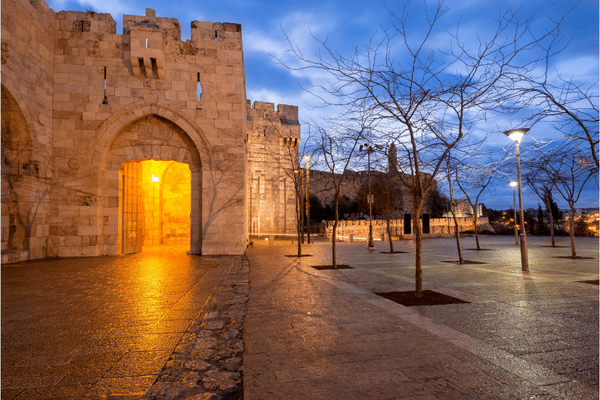
TORAH
NEVI'IM
KETUVIM
Chapter 17
Translation and Transliteration of
Listen to this chapter in Hebrew:
- Commentary
- Buy E-book
- Buy the Israel Bible
1There was a man in the hill country of Efraim whose name was Micha.
vai-hee EESH may-har ef-RA-yim ush-MO mee-KHAI-hu
אוַיְהִי־אִישׁ מֵהַר־אֶפְרָיִם וּשְׁמוֹ מִיכָיְהוּ׃
2He said to his mother, “The eleven hundred shekalim of silver that were taken from you, so that you uttered an imprecation which you repeated in my hearing—I have that silver; I took it.” “Blessed of Hashem be my son,” said his mother.
va-YO-mer l'-i-MO E-lef u-may-AH ha-KE-sef a-SHER lu-kakh LAKH v'-AT a-LEET v'-GAM a-MART b'-oz-NAI hi-nay ha-KE-sef i-TEE a-NEE l'-kakh-TEEV va-TO-mer i-MO ba-RUKH b'-NEE la-do-NAI
בוַיֹּאמֶר לְאִמּוֹ אֶלֶף וּמֵאָה הַכֶּסֶף אֲשֶׁר לֻקַּח־לָךְ ואתי [וְאַתְּ] אָלִית וְגַם אָמַרְתְּ בְּאָזְנַי הִנֵּה־הַכֶּסֶף אִתִּי אֲנִי לְקַחְתִּיו וַתֹּאמֶר אִמּוֹ בָּרוּךְ בְּנִי לַיהֹוָה׃
3He returned the eleven hundred shekalim of silver to his mother; but his mother said, “I herewith consecrate the silver to Hashem, transferring it to my son to make a sculptured image and a molten image. I now return it to you.”
va-YA-shev et e-lef u-may-AH ha-KE-sef l-i-MO va-TO-mer i-MO hak-DAYSH hik-DASH-tee et ha-KE-sef la-do-NAI mi-ya-DEE liv-NEE la-a-SOT PE-sel u-ma-say-KHAH v'-a-TAH a-shee-VE-nu LAKH
גוַיָּשֶׁב אֶת־אֶלֶף־וּמֵאָה הַכֶּסֶף לְאִמּוֹ וַתֹּאמֶר אִמּוֹ הַקְדֵּשׁ הִקְדַּשְׁתִּי אֶת־הַכֶּסֶף לַיהֹוָה מִיָּדִי לִבְנִי לַעֲשׂוֹת פֶּסֶל וּמַסֵּכָה וְעַתָּה אֲשִׁיבֶנּוּ לָךְ׃
4So when he gave the silver back to his mother, his mother took two hundred shekalim of silver and gave it to a smith. He made of it a sculptured image and a molten image, which were kept in the house of Micha.
va-YA-shev et ha-KE-sef l-i-MO va-ti-KAKH i-MO ma-TA-yim KE-sef va-ti-t'-NAY-hu la-tzo-RAYF va-ya-a-SAY-hu PE-sel u-ma-say-KHAH vai-HEE b'-VAYT mee-KHAI-hu
דוַיָּשֶׁב אֶת־הַכֶּסֶף לְאִמּוֹ וַתִּקַּח אִמּוֹ מָאתַיִם כֶּסֶף וַתִּתְּנֵהוּ לַצּוֹרֵף וַיַּעֲשֵׂהוּ פֶּסֶל וּמַסֵּכָה וַיְהִי בְּבֵית מִיכָיְהוּ׃
5Now the man Micha had a house of Hashem; he had made an ephod and teraphim and he had inducted one of his sons to be his Kohen.
v'-ha-EESH mee-KHAH LO BAYT e-lo-HEEM va-YA-as ay-FOD ut-ra-FEEM vai-ma-LAY et YAD a-KHAD mi-ba-NAV vai-hee LO l'-kho-HAYN
הוְהָאִישׁ מִיכָה לוֹ בֵּית אֱלֹהִים וַיַּעַשׂ אֵפוֹד וּתְרָפִים וַיְמַלֵּא אֶת־יַד אַחַד מִבָּנָיו וַיְהִי־לוֹ לְכֹהֵן׃
6In those days there was no king in Yisrael; every man did as he pleased.
ba-ya-MEEM ha-HAYM AYN ME-lekh b'-yis-ra-AYL EESH ha-ya-SHAR b'-ay-NAV ya-a-SEH
ובַּיָּמִים הָהֵם אֵין מֶלֶךְ בְּיִשְׂרָאֵל אִישׁ הַיָּשָׁר בְּעֵינָיו יַעֲשֶׂה׃
17:6 In those days there was no king in Yisrael; every man did as he pleased.
Sefer Shoftim repeatedly teaches that the lack of a king, enabling everyone to do whatever was right in their eyes, is the preeminent problem of this era. According to the Bible, the king should not be responsible only for the legal, military and economic affairs of the nation. He should also be responsible for ensuring that the society is moral and follows Hashem’s Torah. Having a righteous king in Yerushalayim will be part of the complete redemption.
7There was a young man from Beit Lechem of Yehuda, from the clan seat of Yehuda; he was a Levite and had resided there as a sojourner.
vai-hee NA-ar mi-BAYT LE-khem y'-hu-DAH mi-mish-PA-khat y'-hu-DAH v'-HU lay-VEE v'-HU gar SHAM
זוַיְהִי־נַעַר מִבֵּית לֶחֶם יְהוּדָה מִמִּשְׁפַּחַת יְהוּדָה וְהוּא לֵוִי וְהוּא גָר־שָׁם׃
8This man had left the town of Beit Lechem of Yehuda to take up residence wherever he could find a place. On his way, he came to the house of Micha in the hill country of Efraim.
va-YAY-lekh ha-EESH may-ha-EER mi-BAYT LE-khem y'-hu-DAH la-GUR ba-a-SHER yim-TZA va-ya-VO har ef-RA-yim ad BAYT mee-KHAH la-a-SOT dar-KO
חוַיֵּלֶךְ הָאִישׁ מֵהָעִיר מִבֵּית לֶחֶם יְהוּדָה לָגוּר בַּאֲשֶׁר יִמְצָא וַיָּבֹא הַר־אֶפְרַיִם עַד־בֵּית מִיכָה לַעֲשׂוֹת דַּרְכּוֹ׃
9“Where do you come from?” Micha asked him. He replied, “I am a Levite from Beit Lechem of Yehuda, and I am traveling to take up residence wherever I can find a place.”
va-yo-mer LO mee-KHAH may-A-yin ta-VO va-YO-mer ay-LAV lay-VEE a-NO-khee mi-BAYT LE-khem y'-yu-DAH v'-a-no-KHEE ho-LAYKH la-GUR ba-a-SHER em-TZA
טוַיֹּאמֶר־לוֹ מִיכָה מֵאַיִן תָּבוֹא וַיֹּאמֶר אֵלָיו לֵוִי אָנֹכִי מִבֵּית לֶחֶם יְהוּדָה וְאָנֹכִי הֹלֵךְ לָגוּר בַּאֲשֶׁר אֶמְצָא׃
10“Stay with me,” Micha said to him, “and be a father and a Kohen to me, and I will pay you ten shekalim of silver a year, an allowance of clothing, and your food.” The Levite went.
va-YO-mer LO mee-KHAH sh'-VAH i-ma-DEE veh-yay LEE l'-AV ul-kho-HAYN v'-a-no-KHEE e-ten l'-KHA a-SE-ret KE-sef la-ya-MEEM v'-AY-rekh b'-ga-DEEM u-mikh-ya-TE-kha va-YAY-lekh ha-lay-VEE
יוַיֹּאמֶר לוֹ מִיכָה שְׁבָה עִמָּדִי וֶהְיֵה־לִי לְאָב וּלְכֹהֵן וְאָנֹכִי אֶתֶּן־לְךָ עֲשֶׂרֶת כֶּסֶף לַיָּמִים וְעֵרֶךְ בְּגָדִים וּמִחְיָתֶךָ וַיֵּלֶךְ הַלֵּוִי׃
11The Levite agreed to stay with the man, and the youth became like one of his own sons.
va-YO-el ha-lay-VEE la-SHE-vet et ha-EESH vai-HEE ha-NA-ar LO k'-a-KHAD mi-ba-NAV
יאוַיּוֹאֶל הַלֵּוִי לָשֶׁבֶת אֶת־הָאִישׁ וַיְהִי הַנַּעַר לוֹ כְּאַחַד מִבָּנָיו׃
12Micha inducted the Levite, and the young man became his Kohen and remained in Micha's shrine.
vai-ma-LAY mee-KHAH et YAD ha-lay-VEE vai-hee LO ha-NA-ar l'-kho-HAYN vai-HEE b'-VAYT mee-KHAH
יבוַיְמַלֵּא מִיכָה אֶת־יַד הַלֵּוִי וַיְהִי־לוֹ הַנַּעַר לְכֹהֵן וַיְהִי בְּבֵית מִיכָה׃
13“Now I know,” Micha told himself, “that Hashem will prosper me, since the Levite has become my Kohen.”
va-YO-mer mee-KHAH a-TAH ya-DA-tee kee yay-TEEV a-do-NAI LEE KEE ha-yah LEE ha-lay-VEE l'-kho-HAYN
יגוַיֹּאמֶר מִיכָה עַתָּה יָדַעְתִּי כִּי־יֵיטִיב יְהֹוָה לִי כִּי הָיָה־לִי הַלֵּוִי לְכֹהֵן׃







